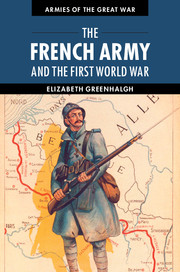Book contents
- Frontmatter
- Contents
- List of figures
- List of maps
- List of tables
- Preface
- List of abbreviations
- Introduction
- 1 The pre-war Army
- 2 1914: From the frontiers to Flanders
- 3 1915: On the offensive
- 4 1916: Verdun and the Somme
- 5 General Nivelle and his 1917 offensive
- 6 Restoring the Army
- 7 1918: German offensives
- 8 The path to victory
- 9 Armistices and demobilisation
- 10 From 1914 to 1919: Aux armes, citoyens!
- Notes
- Bibliographic essay
- Index
2 - 1914: From the frontiers to Flanders
Published online by Cambridge University Press: 05 November 2014
- Frontmatter
- Contents
- List of figures
- List of maps
- List of tables
- Preface
- List of abbreviations
- Introduction
- 1 The pre-war Army
- 2 1914: From the frontiers to Flanders
- 3 1915: On the offensive
- 4 1916: Verdun and the Somme
- 5 General Nivelle and his 1917 offensive
- 6 Restoring the Army
- 7 1918: German offensives
- 8 The path to victory
- 9 Armistices and demobilisation
- 10 From 1914 to 1919: Aux armes, citoyens!
- Notes
- Bibliographic essay
- Index
Summary
The opening battles: from the frontiers to the river Marne
On the evening of 2 August, Joffre warned the commanders of the covering forces that he did not intend to launch a general offensive until all his forces were assembled. He moved Fourth Army forward from its planned location to between Fifth and Third after learning that Germany had violated Luxembourg’s neutrality, and he repeated the warning that troops were not to breach the 10-kilometre line behind the frontiers unless to repel any enemy incursion. There was to be no provocation; it must be Germany who declared war on France. This Germany did on 3 August. The German charge that French aircraft had bombed Nürnberg was false propaganda. Britain declared war on Germany on 4 August after the German violation of Luxembourg and Belgium swung both public opinion and the uncertain Cabinet members in favour of intervention. They had caused considerable anguish to France’s ambassador in London, Paul Cambon, as they deliberated.
The Grand Quartier Général (French headquarters in the field, GQG) would operate in Vitry-le-François in the Marne département from 5 August. The fifty or so GQG officers were supervised by the major général (Joffre’s chief of staff) General Emile Belin. They manned three bureaux: the first, led by Colonel Poindron, dealt with personnel and the transport and supply of materiel; the second handled intelligence under Colonel Dupont; the third, led by Colonel Pont, dealt with operations. In addition, a ‘Direction de l’Arrière’, the equivalent of ‘lines of communication’, operated the Direction des étapes et des services under General Laffon de Ladébat. The second and third bureaux received their directions from the first sub-chief of staff, General Henri Berthelot; the first and the Direction de l’Arrière came under the direction of the second sub-chief, General Deprez (soon replaced, in mid-August 1914, by Colonel Maurice Pellé, former military attaché in Berlin). The missi dominici of Operations acted as liaison officers with the army commanders, reporting back to Joffre for good or for ill on the armies in the field. Their influence became feared and detested in equal measure. Colonel Pénelon and Major Herbillon acted as liaison officers with the President of the Republic and the government.
- Type
- Chapter
- Information
- The French Army and the First World War , pp. 37 - 69Publisher: Cambridge University PressPrint publication year: 2014

